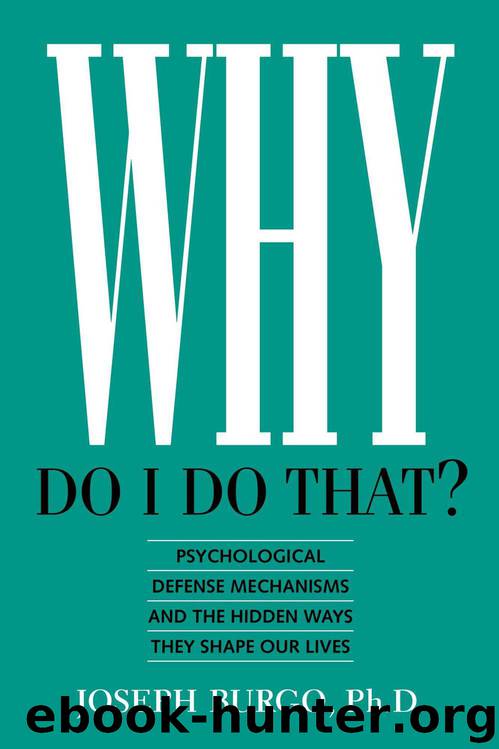Why Do I Do That?: Psychological Defense Mechanisms and the Hidden Ways They Shape Our Lives by Joseph Burgo PhD

Author:Joseph Burgo PhD [Burgo PhD, Joseph]
Language: eng
Format: epub, pdf
ISBN: 9780988443105
Publisher: New Rise Press
Published: 2013-12-30T18:30:00+00:00
These phrases all imply a kind of evacuation or emptying. Through impassioned speech (‘venting” or “letting off steam”), we may relieve emotional pressure; when we complain at great length to a friend (“dumping” or “unloading”) we transfer the burden of our feelings onto the other person. The wish to rid themselves of painful emotions, to shift them onto someone else, is what motivates people who make a habit of venting or dumping. They are projecting (that is, getting rid of something) in a larger sense than we typically use the term.
Without the benefit of words, infants do something similar, ridding themselves of painful emotion by screaming or crying it out. In the process, this evacuated (projected) pain makes their caretakers feel distressed. Just as you may have felt awful after an evening spent listening to a friend vent, the parents absorb the child’s pain and feel highly uncomfortable – so much so that they usually feel the need to do something. We feel an infant’s pain and try to figure out what it means. Do we need to feed the baby? Change its diaper? Comfort it?
So in an entirely appropriate way, babies evacuate or project their unbearable experience into us,18 evoking an empathic response so we’ll help them with their pain or discomfort. From an evolutionary perspective, you could say that projection came into being not only as the earliest defense mechanism, meant to help the struggling human infant cope with (get rid of) unbearable experience, but also as a form of communication that stimulates care-giving responses in the parents. Projection is a normal, everyday part of parent-child relationships and an intermittent feature of most other relationships as well.
In the normal course of things, when they’re tended well enough or they’re not too difficult for their parents to bear, babies learn to understand and tolerate their own experience. Over the years as they grow up, children don’t need constantly to project their experiences outside but can keep them inside and deal with those feelings themselves. In other words, with the help of its caretakers, the infant’s unbearable fear, pain, anxiety, etc. gradually become tolerable.
Download
Why Do I Do That?: Psychological Defense Mechanisms and the Hidden Ways They Shape Our Lives by Joseph Burgo PhD.pdf
This site does not store any files on its server. We only index and link to content provided by other sites. Please contact the content providers to delete copyright contents if any and email us, we'll remove relevant links or contents immediately.
Should I Stay or Should I Go? by Ramani Durvasula(7658)
Why We Sleep: Unlocking the Power of Sleep and Dreams by Matthew Walker(6706)
Fear by Osho(4727)
Flow by Mihaly Csikszentmihalyi(4689)
Rising Strong by Brene Brown(4451)
Why We Sleep by Matthew Walker(4434)
The Hacking of the American Mind by Robert H. Lustig(4375)
How to Change Your Mind by Michael Pollan(4355)
Too Much and Not the Mood by Durga Chew-Bose(4338)
Lost Connections by Johann Hari(4173)
He's Just Not That Into You by Greg Behrendt & Liz Tuccillo(3891)
Evolve Your Brain by Joe Dispenza(3671)
The Courage to Be Disliked by Ichiro Kishimi & Fumitake Koga(3489)
Crazy Is My Superpower by A.J. Mendez Brooks(3398)
In Cold Blood by Truman Capote(3375)
Resisting Happiness by Matthew Kelly(3337)
What If This Were Enough? by Heather Havrilesky(3308)
The Book of Human Emotions by Tiffany Watt Smith(3303)
Descartes' Error by Antonio Damasio(3271)
